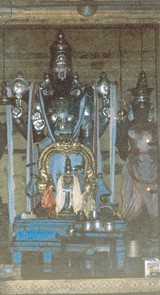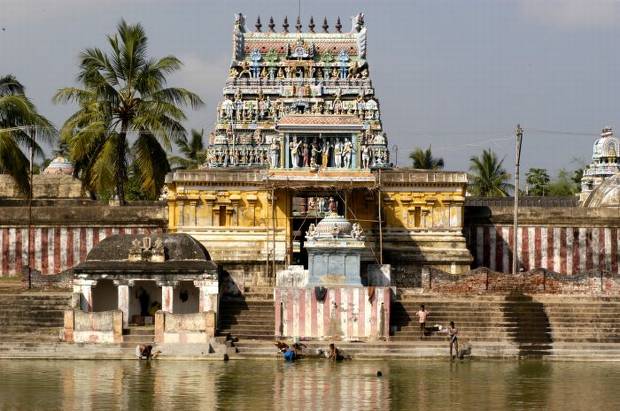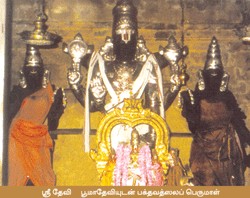We will today see the 9th sloka from the same Thirukkannamangai temple:
sanjaya uvaca
evam uktva hrishikesham
gudakeshah parantapah
na yotsya iti govindam
uktva tusnim babhuva ha
“ Sanjaya told [Dhridhrashtra]. Having said thus, Gudakesa [Arjuna] told Sri Hrishikesa [Sri Krishna] ‘Govinda! I will not fight’ and became silent, what a surprise!”
Arjuna has told his reasoning for not fighting. All the relatives, friends and teachers have assembled and he could not fight with them. Killing relatives and annihilating a dynasty or family is a sin, which will lead to eradication of kula dharma and so take him to hell. Enjoyment cannot be with blood stained hands. Even if the enemy camp was ready, killing near ones is sin. The very sight of these people ready to fight dries up his senses. Even if a prosperous, entire world or heaven is offered to rule, Arjuna can never think of fighting. Having given out his mind so elaborately, Arjuna takes asylum at Sri Krishna and stops talking with a final say that he will not fight. Sanjaya, who is narrating alive the happenings on the battlefield to King Dhridharashtra, exclaims with the word ‘ha’. Because he is surprised that a great warrior Arjuna is declaring he will not fight. Sanjaya refers to Arjuna as Gudakesa or the one who has conquered sleep and laziness, the hallmarks of Tamas quality. Arjuna is not tired or feeling weak to fight. Nor is he cowardly and afraid to fight.That is why the word paranthapa or the one who burns the enemies is used by Sanjaya.But out of shear sympathy for those arrayed against, he is refusing to fight. In the last sloka Arjuna tells Sri Krishna, that his sensual organs are all dried up at the sight of his loved ones in the opposite camp. So, significantly, Sanjaya denotes Sri Krishna with the epithet Hrishikesa or the Conqueror of the organs [both sensual and active]. We have to understand that God is the prime mover behind all the organs functioning in our body. Arjuna tells Sri Krishna that he is not going to fight. He addresses Him as Govinda. This word implies three meanings. Sri Andal in her Thiruppavai repeats this name of the Lord in the 27th [koodarai vellum], 28th [karavaigal pinsenru] and 29th [chitran chirukalai] pasurams. Govinda means Protector of cows. It also means protector of the earth. And, it can also mean protector of souls. In this temple the Lord is called Bha[k]tharavi Perumal, which means He is the Aavi or Soul of the devotees. It seems the Lord prefers cow herding to being the Leader of all the gods or residing in Sri Vaikuntam. Sri Andal says karavaigal pin senru, which is going behind the cows. The cows do not say to Sri Krishna, Who is following them, not to come behind them. In fact, He is in every soul and follows as the inner conscience and directs. But if we say to Him that He need not follow and we will go our own way, He lets us go and we get entangled into all types of situations. On the other hand, if we allow Him to follow us or direct us, we are assured of proper destiny. So here Arjuna calls Him Govinda and wants Him to direct in the right path








